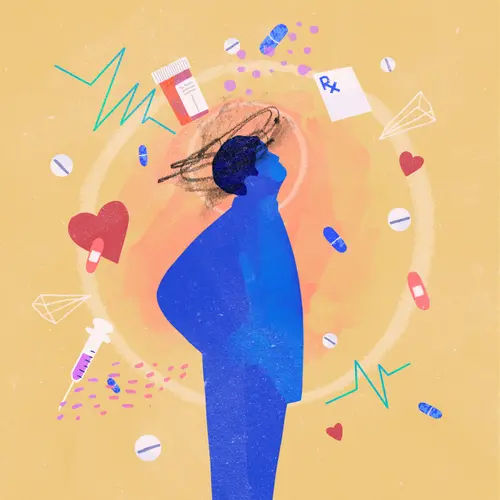April 10, 2000 (Petaluma, Calif.) -- "I'm to the point I stay home. I won't go anywhere alone," one visitor confides.
"I almost always skip classes, except when I have to take exams," says another. "I don't really know what triggers my panics, but in just one second my heart starts beating like crazy. ..."
"Has anyone out there tried medication?" someone else asks. "Does it help?"
These visitors to an anxiety chat room are among thousands of the shy and socially awkward who have found that the Internet can be a refuge, a place where they can go without fear of being embarrassed or ridiculed. Many suffer from more than just shyness, experts say. They have a condition called social anxiety disorder, also known as social phobia.
The condition has been officially recognized as a psychiatric disorder since 1980. But it hit the headlines just last year, when the U.S. Food and Drug Administration gave the pharmaceutical giant SmithKline the green light to advertise the first drug for social phobia, Paxil, generically known as paroxetine. The drugmaker launched a nationwide ad campaign with the slogan, "Imagine being allergic to people."
How do you know if you're painfully shy -- or a social phobic? And if fear of social situations is short-circuiting your life, is there anything you can do?
According to a 1998 study called the National Comorbidity Survey, conducted by Ronald Kessler, PhD, at Harvard Medical School, more than 13% of Americans experience the symptoms of social anxiety disorder at some point in their lives. The same survey found that at any given time, a startling 4.5% of the population meets the diagnostic criteria, making social anxiety disorder the third most common mental disorder in the nation, after depression and alcoholism. Experts like R. Bruce Lydiard, MD, professor of psychiatry at the Medical University of South Carolina, applaud the new attention being given to social phobia. "The biggest problem we face is reaching these patients," he says. "Many are too afraid to see a doctor."
Shrinking Violet or Social Phobic?
But others worry that garden-variety shyness could end up being labeled as a mental illness. Lynn Henderson, who directs the Shyness Clinic in California, and Philip Zimbardo, a psychologist at Stanford University, caution that medication is being promoted as "a shyness cure-all, a magic pill," when the problem for many people is nothing more serious than inadequate social skills.
Like any personality trait, shyness occurs across a spectrum -- from being uncomfortable at parties to being unable to leave the house for fear of being seen and judged by others.
Anxiety- Does fear of embarrassment cause you to avoid doing things or speaking to people?
- Do you avoid activities in which you are the center of attention?
- Are being embarrassed or looking stupid among your worst fears?
If people answer yes to at least two of these questions, says Davidson, they are probably phobic. If these fears cause you to hide at home or avoid contact with anyone but your closest friends, you may want to consider therapy.
Drugs, Counseling, or Both
Untreated, social phobia can lead to serious problems, so it's important to identify and treat this condition. Psychiatrist Murray Stein and his colleagues at the University of California at Los Angeles have found that almost six in ten social phobics are clinically depressed, and one in four have recently been treated for substance abuse, according to a review article published in the December 1999 Journal of Clinical Psychiatry. The researchers speculate that the isolation brought on by social phobia contributes to the other disorders.
Luckily, a variety of treatments can help. In a study published in the August 26, 1998 Journal of the American Medical Association, 55% of patients taking Paxil reported that their symptoms improved after 11 weeks, compared to only 23.9% of those taking a placebo. Scores on a widely used test that measures social phobia, called the Liebowitz Social Anxiety Scale, fell by 39.1% in the Paxil group compared with only 17.4% in patients given the placebo.
In clinical practice, psychiatrists are discovering that other drugs similar to Paxil, including Serzone, Effexor, and Zoloft, can also effectively treat social phobia, says Lydiard.
Are such drugs likely to be overused? Probably not. They seem to work only in people with serious social anxiety, according to Davidson. Paxil won't turn a normally shy person into a social butterfly, in other words. And most people are willing to take a prescription drug -- which usually costs them money and can have side effects -- only if they perceive that they have a real problem.
Medication is only one approach. Psychotherapy can also help. At the University of California at Los Angeles' Social Phobia Clinic, patients meet once a week for 14 weeks of group sessions designed to help them replace negative thoughts ("She won't like me," or "I look stupid") with more positive thinking. In behavioral therapy sessions, patients are put in anxiety-producing situations in order to defuse their fears.
So it turns out that chatting about this problem does help, as more and more social phobia sufferers are discovering by going online to share their feelings with others. Several social phobia experts believe chat groups are useful to patients with the disorder. It's good to know that there's at least one place on the Internet -- so often blamed for isolating us -- where people can go to escape feelings of isolation.
Peter Jaret is a contributing editor at Health and National Wildlife magazines. His work has appeared in Newsweek, National Geographic, Hippocrates, Men's Journal, Vogue, Glamour, and many other magazines. He lives in Petaluma, Calif.
